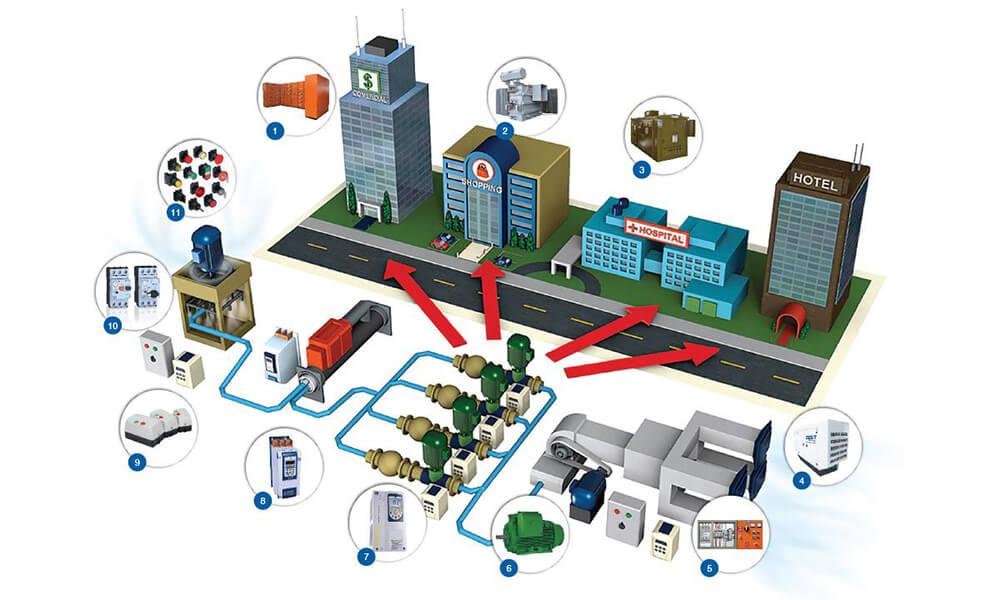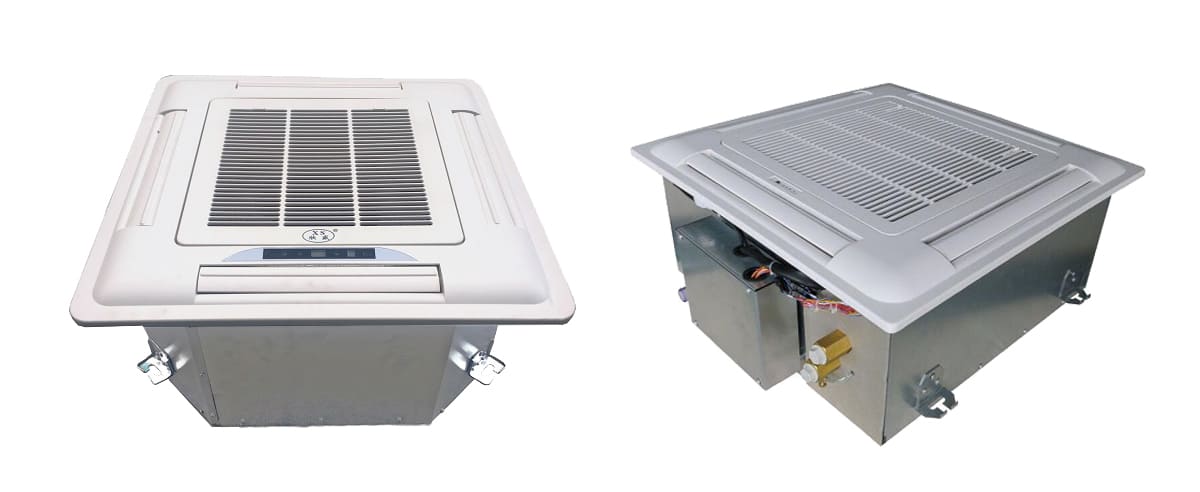In the realm of climate control for homes and buildings, two terms often find themselves in the spotlight: HVAC and air conditioning. These terms are frequently used interchangeably, but beneath the surface, they carry distinct differences that can impact the comfort and efficiency of indoor spaces. In this comprehensive guide, we will delve into the world of HVAC (Heating, Ventilation, and Air Conditioning) and air conditioning to shed light on their unique roles and functions.
HVAC (Heating, Ventilation, and Air Conditioning) and air conditioning are closely related but distinct concepts in the realm of indoor climate control. While air conditioning specifically focuses on the cooling of indoor air, typically involving the use of refrigeration technology to lower temperature and humidity, HVAC encompasses a broader scope. HVAC includes not only air conditioning but also heating, ventilation, and the overall regulation of indoor air quality.
Therefore, HVAC systems are designed to provide a complete climate control solution, encompassing both cooling and heating, along with mechanisms for air circulation and filtration, to ensure a comfortable and healthy indoor environment. In summary, air conditioning is a subset of HVAC, which addresses a specific aspect of climate control, i.e., cooling, while HVAC covers the entire spectrum of indoor environmental control.
Understanding HVAC
In this section, we’ll explore the world of HVAC (Heating, Ventilation, and Air Conditioning), a multifaceted system that goes beyond the notion of simple temperature control. HVAC is the cornerstone of indoor comfort and environmental control in homes, offices, factories, and more.
Let’s take a look at a video for reference:
Defining HVAC
At its core, HVAC stands for Heating, Ventilation, and Air Conditioning. It represents a holistic approach to climate control within indoor spaces. While many associate HVAC with heating and cooling, it encompasses a broader range of functions that work together seamlessly.
The Components of HVAC
HVAC systems are a symphony of components, each playing a vital role:
Heating: The heating component of HVAC systems utilizes sources such as furnaces, boilers, or heat pumps to raise indoor temperatures during cold seasons.
Ventilation: Ventilation is about circulating fresh outdoor air into indoor spaces. It ensures proper air exchange, removes indoor pollutants, and maintains air quality.
Air Conditioning: The cooling aspect of HVAC involves air conditioning units that lower indoor temperatures, making spaces comfortable during hot weather.
Comprehensive Climate Control
HVAC systems are known for their comprehensive approach to indoor climate control:
Year-Round Comfort: HVAC systems provide year-round comfort, offering heating in winter, cooling in summer, and ventilation throughout the year.
Versatile Applications: They find applications in various settings, from residential homes to commercial buildings, industrial facilities, and healthcare institutions.
Understanding Air Conditioning
In this section, we’ll delve into the world of air conditioning, a specialized aspect of HVAC systems primarily focused on cooling indoor spaces. While air conditioning systems are a subset of HVAC, their role in maintaining comfortable temperatures during sweltering summers is indispensable.
Let’s take a look at a video for reference:
Defining Air Conditioning
Air conditioning refers to the process of altering indoor air properties, primarily to achieve a cooler and more comfortable environment. Unlike HVAC, which encompasses a wide range of functions, air conditioning systems specialize in cooling.
The Core Components
Air conditioning systems consist of specific components designed for efficient cooling:
Evaporator: This component absorbs heat from indoor air, causing the air to cool down as a result.
Compressor: The compressor pressurizes refrigerant gas, converting it into a high-temperature, high-pressure gas.
Condenser: The condenser releases heat outside, allowing the refrigerant to return to a low-pressure, low-temperature liquid state.
Refrigerant: Refrigerants are crucial to the cooling process, as they circulate through the system, undergoing phase changes to absorb and release heat.
Focus on Cooling
Air conditioning systems are primarily designed for cooling purposes, making them ideal for combating hot weather and maintaining comfortable indoor temperatures. While they provide relief from the heat, they do not offer the comprehensive functionality of HVAC systems.
Key Differences Between HVAC and Air Conditioning
While HVAC and air conditioning are both integral to indoor climate control, they serve different roles and have distinct characteristics. In this section, we’ll explore the essential differences that set these systems apart.
1. Scope of Services
HVAC, as the acronym suggests, encompasses Heating, Ventilation, and Air Conditioning. This comprehensive system provides a range of services that go beyond cooling:
Heating: HVAC systems are equipped to provide heating during colder seasons, ensuring warmth and comfort indoors.
Ventilation: Ventilation is a critical part of HVAC, facilitating air exchange and maintaining indoor air quality by removing pollutants.
Air Conditioning: Just like standalone air conditioning systems, HVAC includes the capability to cool indoor spaces during hot weather.
2. Specialization in Cooling
In contrast, air conditioning systems are specialized in the singular task of cooling indoor spaces. They do not encompass heating or ventilation functions.
3. Year-Round Climate Control
HVAC systems are designed to provide year-round climate control, making them versatile for all seasons. They offer:
Winter Heating: HVAC systems ensure warmth in cold weather by using heating components.
Summer Cooling: During hot months, HVAC systems offer cooling capabilities similar to standalone air conditioning units.
Continuous Ventilation: Ventilation is a constant feature of HVAC, ensuring year-round air circulation and indoor air quality maintenance.
4. Focused Cooling for Air Conditioning
Air conditioning systems, on the other hand, are primarily focused on cooling. They excel at providing relief during hot weather but lack the ability to heat or offer year-round ventilation like HVAC systems.
5. Energy Efficiency
HVAC systems are more energy-intensive due to their multifunctionality. While they offer comprehensive climate control, this versatility can result in higher energy consumption.
Air conditioning systems, with their specialized focus on cooling, are often optimized for cooling efficiency, potentially making them more energy-efficient if cooling is the primary concern.
6. Environmental Impact
The environmental impact of both systems can vary based on design and maintenance. While HVAC systems have the potential for higher energy consumption due to their multifunctionality, they can be energy-efficient when properly managed. Air conditioning systems, by virtue of specialization, may have a lower environmental footprint, particularly when designed for efficiency and paired with eco-friendly refrigerants.
7. Versatility vs. Specialization
In essence, the key difference between HVAC and air conditioning lies in versatility vs. specialization. HVAC systems offer a versatile approach to climate control, addressing heating, cooling, and ventilation needs, while air conditioning systems specialize in cooling and are ideal for tackling hot weather.

HVAC vs. Air Conditioning: A Closer Look
To better understand the differences between HVAC and air conditioning, let’s take a closer look at the components and functions that define these systems.
1. HVAC Components and Functions
Heating: Heating is a crucial aspect of HVAC systems. It is achieved through various means, including furnaces, boilers, or heat pumps. Heating ensures indoor comfort during cold seasons, maintaining a cozy environment.
Ventilation: Ventilation is the process of bringing fresh outdoor air into indoor spaces. It serves multiple purposes, including maintaining air quality, removing pollutants, and preventing the buildup of stale air.
Air Conditioning: HVAC systems incorporate air conditioning components for cooling. These components operate similarly to standalone air conditioning systems, extracting heat from indoor air and providing cooling during warm weather.
2. Air Conditioning Components and Functions
Evaporator: In air conditioning systems, the evaporator plays a pivotal role in cooling. It absorbs heat from indoor air, causing the air to cool down as a result.
Compressor: The compressor pressurizes refrigerant gas, transforming it into a high-temperature, high-pressure gas.
Condenser: The condenser releases heat outside, allowing the refrigerant to return to a low-pressure, low-temperature liquid state.
Refrigerant: Refrigerants are essential to the cooling process. They circulate through the system, undergoing phase changes to absorb and release heat efficiently.
3. Comprehensive Functionality of HVAC
HVAC systems stand out due to their comprehensive functionality. They provide year-round climate control, ensuring comfort in all seasons. Whether it’s heating in winter, cooling in summer, or ventilation throughout the year, HVAC systems offer a complete package.
4. Specialization in Cooling for Air Conditioning
Air conditioning systems specialize in the art of cooling. While they excel at providing relief during hot weather, their focus is singular. They do not provide heating during colder months, and ventilation is not their primary function.
5. Choosing the Right System
The choice between HVAC and air conditioning depends on your specific needs. If you require a system that delivers comprehensive climate control, including heating and ventilation, HVAC is the solution. On the other hand, if cooling is your primary concern, a dedicated air conditioning system may be more suitable.
4.6 Efficiency and Maintenance
Efficiency and maintenance also play a role in the decision-making process. While HVAC systems offer versatility, they may consume more energy due to their multifunctionality. Air conditioning systems, being specialized, can be optimized for cooling efficiency. Regular maintenance is crucial for both systems to ensure optimal performance.
Common Applications
Both HVAC and air conditioning systems find application in various settings. In this section, we’ll explore their common uses and where each excels in delivering comfort.
HVAC Applications
Residential Homes: HVAC systems are prevalent in residential settings, offering comprehensive climate control. They ensure comfortable indoor temperatures year-round, making them ideal for family homes.
Commercial Buildings: HVAC systems are a staple in offices, retail stores, and commercial establishments. They create an inviting atmosphere for customers and a productive environment for employees.
Industrial Facilities: In industrial settings, HVAC systems maintain optimal working conditions. They regulate temperatures to ensure machinery functions efficiently and create a comfortable workspace for employees.
Healthcare Institutions: Hospitals and healthcare facilities rely on HVAC systems to maintain sterile environments and regulate temperatures for patient comfort.
Air Conditioning Applications
Residential Cooling: Air conditioning systems are widely used for residential cooling needs. They combat the heat during summer, creating a cool oasis within homes.
Commercial Cooling: Commercial buildings, including offices and shopping centers, depend on air conditioning for cooling indoor spaces, providing comfort to occupants and shoppers.
Hospitality Industry: Hotels and resorts use air conditioning to ensure a comfortable stay for guests, especially in regions with hot climates.
Data Centers: Air conditioning is crucial in data centers to maintain stable temperatures and protect sensitive equipment from overheating.

Energy Efficiency and Environmental Impact
The environmental impact and energy efficiency of HVAC and air conditioning systems can vary. In this section, we’ll explore these factors to help you make informed choices.
HVAC Efficiency
HVAC systems, due to their multifunctionality, may consume more energy. However, they can be optimized for efficiency through:
Regular Maintenance: Proper maintenance ensures HVAC systems operate efficiently, reducing energy waste.
Programmable Thermostats: Installing programmable thermostats allows precise temperature control, preventing unnecessary energy use.
Energy-Efficient Components: Upgrading to energy-efficient components can significantly reduce energy consumption.
Air Conditioning Efficiency
Air conditioning systems, specializing in cooling, can be optimized for cooling efficiency:
Proper Sizing: Ensuring the system is appropriately sized for the space prevents overuse and energy waste.
Regular Cleaning and Maintenance: Cleaning filters and components improve cooling efficiency.
Energy-Efficient Models: Investing in energy-efficient air conditioning units can lower energy consumption.
Environmental Impact
Both systems can have an environmental impact, which can be mitigated by:
Eco-Friendly Refrigerants: Choosing systems that use eco-friendly refrigerants helps reduce environmental harm.
Proper Disposal: Disposing of old units responsibly prevents refrigerants from harming the environment.
Cost Considerations
Cost considerations play a significant role in selecting between HVAC and air conditioning. In this section, we’ll explore the financial aspects of these systems.
HVAC Costs
HVAC systems tend to be costlier due to their multifunctionality:
Initial Installation: The initial installation of an HVAC system is a significant investment, considering the complexity of the system.
Operating Costs: Operating HVAC systems may lead to higher energy bills due to their comprehensive functions.
Air Conditioning Costs
Air conditioning systems may be more cost-effective:
Initial Installation: The installation cost of air conditioning units is generally lower than for HVAC systems.
Focused Cooling: Since air conditioning systems specialize in cooling, they may result in lower operating costs, especially during hot weather.
Conclusion
As we reach the conclusion of our exploration into HVAC and air conditioning, it’s clear that these systems offer distinct solutions for indoor climate control. Each has its own strengths, and the choice between them depends on your specific needs, priorities, and circumstances.
1. Versatility Meets Specialization
HVAC represents the pinnacle of versatility, providing comprehensive climate control that includes heating, cooling, and ventilation. It ensures year-round comfort, making it an excellent choice for spaces where multifunctionality is essential. In contrast, air conditioning specializes in cooling, excelling in providing relief during hot weather.
2. Energy Efficiency and Environmental Impact
Efficiency and environmental impact are important considerations. While HVAC systems can be energy-intensive due to their multifunctionality, they can be optimized for efficiency with proper maintenance and the use of energy-efficient components. Air conditioning systems, by focusing on cooling, can be energy-efficient when correctly sized and maintained.
Choosing systems with eco-friendly refrigerants and disposing of old units responsibly can mitigate the environmental impact of both HVAC and air conditioning systems.
3. Cost Considerations
Cost plays a significant role in the decision-making process. HVAC systems tend to have higher initial installation costs due to their comprehensive functions. Operating costs may also be higher, especially in regions with extreme weather conditions. Air conditioning systems, with their specialization in cooling, often have lower initial installation costs and can result in lower operating costs during hot weather.
4. Making Informed Choices
In conclusion, whether you opt for the versatility of HVAC or the focused cooling of air conditioning, the key is to make an informed choice that aligns with your unique requirements. Consider factors such as your climate, budget, environmental concerns, and the specific needs of your space. Regular maintenance is crucial for both systems to ensure optimal performance and longevity.
In the end, both HVAC and air conditioning systems have their roles to play in the world of indoor comfort. Understanding their differences empowers you to create environments that are not only comfortable but also efficient and environmentally responsible.
So, as you embark on your journey to create the ideal indoor climate, remember that the choice is yours. Whether it’s the versatility of HVAC or the focused coolness of air conditioning, the destination is the same—your comfort and well-being.

If you want to know more, please click below:
- Grilles, Registers & Diffusers – The Ultimate Guide
- HVAC Linear Slot Diffusers – The Ultimate Guide
- HVAC Egg Crate Diffuser – The Ultimate Guide
- HVAC Jet Nozzle Diffuser – The Ultimate Guide
- HVAC Linear Bar Grilles – The Ultimate Guide
- HVAC Air Swirl Diffusers – The Ultimate Guide
- HVAC Round Ceiling Diffusers – The Ultimate Guide
- Round Ceiling Diffusers – The Ultimate Guide
- Exhaust Air Louver – The Ultimate Guide
- HVAC Registers – The Ultimate Guide


